Can You Take Vitamin D With Other Vitamins
Should everyone be taking vitamin D?
(Image credit:
Getty Images
)
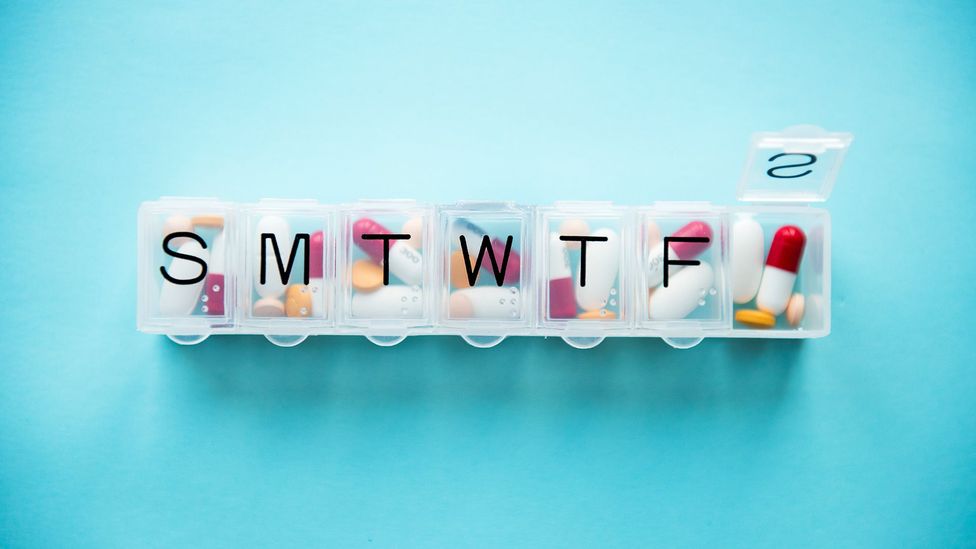
Vitamin D is said to assistance stave off fatigue, depression and even cancer. But some experts argue that for people with healthy levels, supplements are not helpful. What'south the reality?
A
As many countries urge populations to stay at home, many of us are paying more attention to our diets and how the nutrient we consume tin support our health. To help sort out the fact from the fiction, BBC Future is updating some of our most pop nutrition stories from our archive.
Our colleagues at BBC Good Food are focusing on practical solutions for ingredient swaps, nutritious storecupboard recipes and all aspects of cooking and eating during lockdown.
As many of us find ourselves confined to our houses due to social isolation measures, concerns tend to arise about the lack of sunlight – and possible vitamin D deficiency. For many, a become-to fix is to take supplements.
The supplement, later all, has been touted as a near-phenomenon. Both vitamin D2 and D3 supplements are available over-the-counter without a prescription and take been linked to improving amnesty, tiredness and musculus weakness, os pain, and depression. They've as well been said to help stave off cancer and the consequences of ageing.
Y'all might besides like:
• Why vitamin supplements don't piece of work
• The world's most nutritious foods
• What I learnt by living without artificial light
But the debate over whether all adults need to take vitamin D supplements is contentious.
Few doubt the role that vitamin D plays in our bone wellness to regulate calcium and phosphate in the body, which is why those who have a vitamin D deficiency are particularly encouraged to address information technology. And that may be more people than you think: one written report estimates that effectually 20% of the population in the Britain has a profound vitamin D deficiency, for instance.
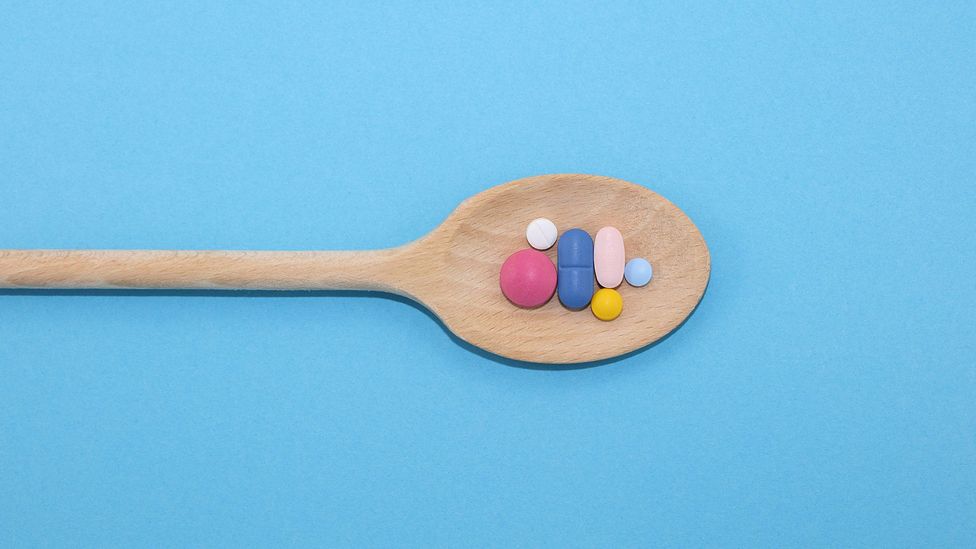
A third of UK adults who supplement their nutrition with vitamins take vitamin D (Credit: Getty Images)
But some experts say that people with healthy levels have no need of vitamin D supplements – which would be most people. In other words, they debate that in healthy people, vitamin D is non, as some have hoped, a way to preclude disease.
So what's the reality?
The nuts
Despite its name, vitamin D is not a vitamin. Instead, it is a hormone that promotes the absorption of calcium in the body. The challenge is that, aside from a few foods like oily fish, vitamin D is hard to find in the average diet. But in the presence of "ultraviolet B" rays, our pare can produce its own from a common cholesterol.
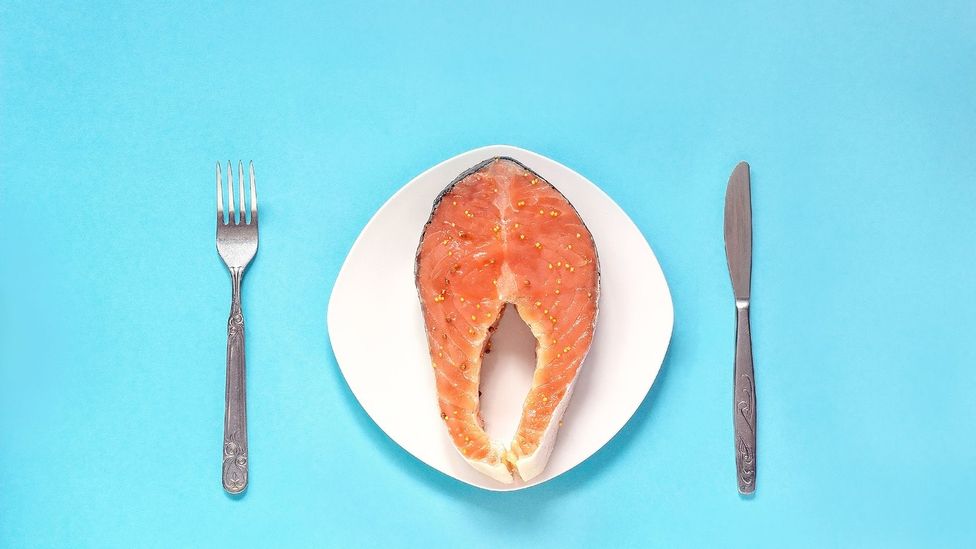
Vitamin D is institute in simply a few foods, like oily fish (Credit: Getty Images)
There are 2 master types of D. The starting time is vitamin D3, which is establish in animals including fish and is the kind the skin makes when exposed to sunlight. The second is vitamin D2, which comes from plant-based foods including mushrooms. Studies have constitute that D3 is more effective, and the conclusions of a 2022 meta-analysis argue that D3 is the preferred pick for supplementation.
Today, the UK's Public Health England (PHE) recommends every adult takes a 10-microgram supplement in autumn and winter, when the angle of the sunlight hit the earth prevents equally many UVB rays from penetrating the atmosphere. The government body also recommends that those at risk of lower vitamin D levels, including people with darker skin, take a supplement year-round.
Other countries follow similar guidelines. In Canada, adults are advised to become 15 micrograms of vitamin D and accept two servings of vitamin-D fortified milk or soy alternatives every day, while cow's milk and margarine must be fortified with vitamin D by law. In the US, adults also are brash to get 15 micrograms, while much of the country's milk, breakfast cereals, margarine, yogurts and orangish juice is fortified, besides.
Those guidelines and fortification efforts came about largely in an attempt to fight rickets in the mid 20th Century. Nosotros know that low vitamin D levels reduce the body's levels of calcium, which leads to a decrease in os density and tin cause rickets, specially in babies and children.
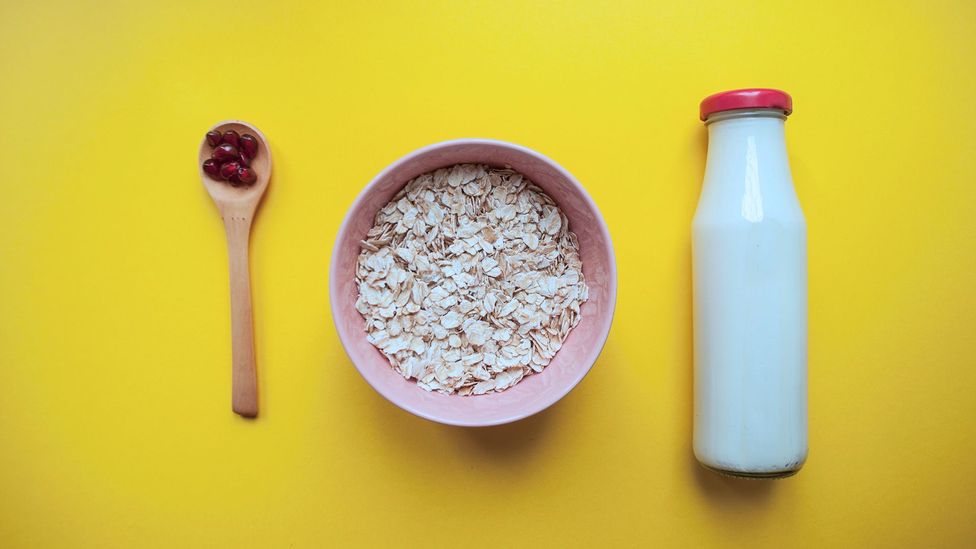
In countries including the Us, Canada and United kingdom, foods like cereal and milk often are fortified with vitamin D (Credit: Getty Images)
However, that communication has recently been expanded upwards, at least by the Association of UK Dieticians, in light of self-isolation during the current pandemic. In a post released in March 2020, as the UK entered spring, it said: "If you are having to self isolate or if you are unable to go exterior, yous should consider taking a daily supplement containing ten micrograms to ensure a healthy vitamin D status (for adults and children over the age of one)."
We know that low vitamin D may cause muscle weakness and fatigue. One written report found that low vitamin D was high amid people with fatigue and that their symptoms improved after v weeks of vitamin D supplements, while a small-scale study from Newcastle University found that low vitamin D could cause fatigue equally depression levels cause mitochondria, the 'power stations' in every jail cell of the body, to be less efficient. Studies of cancer patients have found similar effects. Vitamin D may also help bolster and regulate the immune organization by clearing leaner.
Broken bones
But vitamin D'southward importance doesn't necessarily mean people with healthy levels of vitamin D crave supplements. Consider one of the virtually common reasons for supplementation: bone growth and maintenance.
The current guidelines on how much vitamin D to take were informed by inquiry involving the elderly population living in intendance homes, who don't go as much exposure to the sun and are more prone to fractures and osteoporosis than the full general population. Merely Tim Spector, professor of genetic epidemiology at King's Higher London, has argued that such studies are "probably flawed".
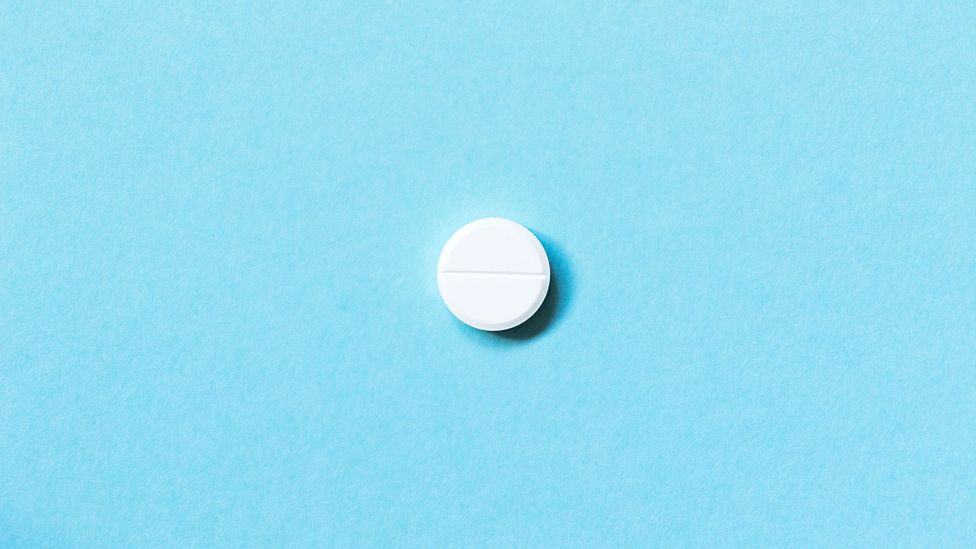
One common reason to have supplements is to promote bone force, but the evidence backside this isn't articulate-cutting (Credit: Getty Images)
It'southward true that the bear witness isn't clear-cut. I meta-assay published in August 2022 concluded that increasing the levels of vitamin D in the general population is unlikely to decrease the take a chance of os fractures in good for you people. And a meta-analysis of 81 studies found that vitamin D supplementation doesn't forestall fractures or falls, or amend bone mineral density. The researchers concluded that guidelines should be updated to reverberate this.
Only Sarah Leyland, osteoporosis nurse consultant at the National Osteoporosis Club, says vitamin D supplements may be useful for at-risk groups who don't go any sunlight exposure. According to the NHS, people but demand to be outside for a short period of time, with hands and forearms uncovered and without sunscreen, to go enough vitamin D between March and October.
"We know that salubrious people living in the community won't reduce their fracture adventure past taking calcium and vitamin D supplements," Leyland says. "However, people who may not be getting plenty – such equally those who are housebound or live in sheltered accommodation – can benefit from these supplements."
However, researchers haven't found articulate show of that, either. One meta-analysis examining the prevention of fractures in community, nursing home and hospital inpatient populations ended that vitamin D alone is unlikely to foreclose fractures in the doses and formulations tested so far in older people. And some show suggests that high doses can really result in an increased number of fractures and falls. 1 randomised report establish that high-dose monthly vitamin D supplements increased the run a risk of falls among the elderly population by 20-thirty% compared to those on a lower dose.
D for disease
At that place is also conflicting research on the relationship betwixt vitamin D and other diseases, fifty-fifty ageing.
One main merits is that vitamin D supplements will boost the immune arrangement. Adrian Martineau, professor of respiratory infection and immunity at The London Schoolhouse of Medicine and Dentistry, Queen Mary University of London, who leads a research group on the furnishings of vitamin D on health, has institute that vitamin D plays a role in improving respiratory infections.
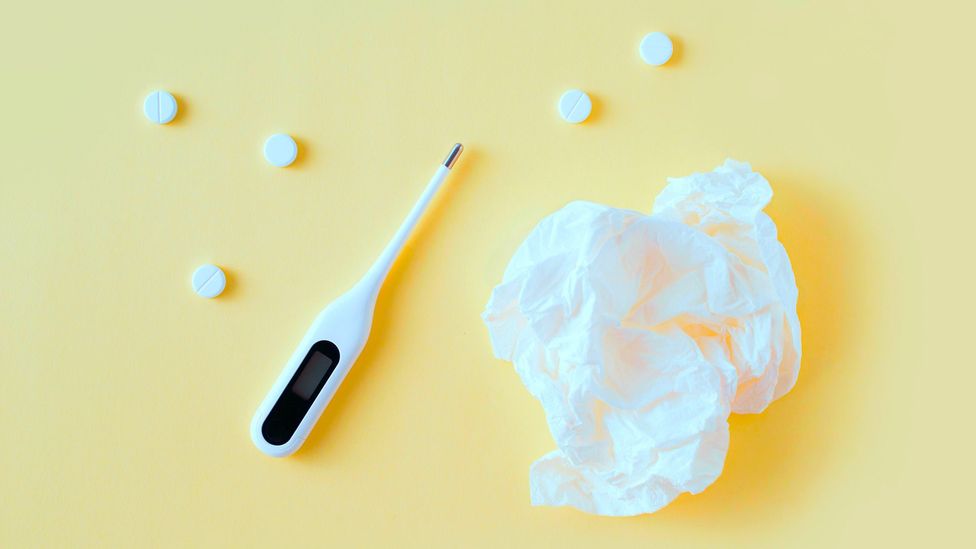
I report establish that vitamin D helps decrease the risk of respiratory infections – though simply slightly (Credit: Alamy)
When his squad analysed raw data from 25 clinical trials involving eleven,000 patients from 14 countries, they institute a small benefit to taking daily or weekly vitamin D supplements to reduce the chance of respiratory infections, asthma attacks and bronchitis. Although the newspaper soon attracted robust criticism, Martineau points out that the reduction of adventure, while slight, is still pregnant and comparable to the effects of other health measures: to prevent a single respiratory infection, you'd have to requite 33 people vitamin D supplements – compared to, for example, giving a flu vaccination to 40 people to prevent a single case of influenza.
Or have ageing. One newspaper looking at the link between vitamin D and life expectancy found that vitamin D3 tin help with protein homeostasis – the process past which proteins are regulated inside cells to maintain their health. "Our observation that D3 improves poly peptide homeostasis and slows ageing highlights the importance of maintaining appropriate vitamin D serum levels," the researchers write.
Only other studies take been less conclusive. Ane meta-analysis concluded that more than inquiry is needed to clarify the effect of vitamin D on mortality. The link between cardiovascular disease and vitamin D likewise has yet been properly established: the link could mean that eye disease is causing low vitamin D levels, not the other way around.
Correlation or causation?
This is an issue with most all of the studies that link low D to diseases.
Ian Reid, professor in medicine at the University of Auckland, believes that diseases cause depression vitamin D levels, as being unwell often leads to spending less fourth dimension outdoors exposed to sunlight, rather than vice versa. "If you lot have whatsoever group of patients with near any disease, their vitamin D levels will be lower than in a healthy individual. This has led some to hypothesise it'southward low vitamin D developing the disease, but there's no evidence to prove it," he says.

Some experts believe people who are unwell take depression vitamin D levels considering they spend less time outdoors, not that their low levels crusade health issues (Credit: Getty Images)
Researchers have constitute that higher vitamin D levels are associated with a lower risk of colorectal cancer – it plays a role in stemming the germination of new blood vessels and stimulating better communication between cells. Vitamin D also has been institute to help maintain normal levels of calcium in the colon, which slows growth of non-malignant simply high-risk cells.
Other studies, including of the link between vitamin D and liver cancer, breast cancer and prostate cancer, suggest there is skillful reason to think that low vitamin D plays a part in the spread of cancer cells. But taking supplements would and so, surely, aid stave off cancer – and a contempo meta-analysis failed to find that supplementation reduced cancer risk.
"This is probable to exist a 2-way street, with cancer causing vitamin D deficiency past affecting vitamin D metabolism, dietary intake and sunday exposure, and vice versa via anti-proliferative effects of vitamin D. The two hypotheses are non mutually exclusive," says Martineau.
D for depression
Some other oft-discussed status is seasonal affective disorder (SAD), a mood disorder caused past the seasonal drib in exposure to sunlight. The link between light exposure and SAD is long-established. Simply once again, a direct link to vitamin D has been difficult to testify.
Evidence suggests there may be a relationship since vitamin D is associated with levels of both serotonin, important for mood regulation, and melatonin, which regulates our sleep. Low levels of either hormone could contribute to Sad symptoms. Researchers have yet to carry out a definitive randomised control trial, however, and the verbal mechanism by which vitamin D bolsters the hormones is unknown. One theory is that vitamin D receptors – which are found in many parts of the brain and concentrated in the hypothalamus, a region involved in our circadian timing – play a part in controlling the trunk'due south hormone levels.
Research has establish that vitamin D plays a wider role in our mental health, from depression to schizophrenia, as well equally in brain development, but how it plays a role besides remains unclear. A meta-assay published earlier this year establish that while at that place is a correlation between lower vitamin D levels and depression, that didn't necessarily hateful D caused depression.
Again, perhaps depressed people just went out less and got less sunlight.
Sunshine serum
If studies are inconclusive, though, perhaps that doesn't reflect on the importance of vitamin D. Perhaps it's the fact that most of them are based on supplements, not sunshine.

Some experts believe that vitamin D is nearly effective when it's from the sun, non supplements (Credit: Getty Images)
Some scientists argue that getting vitamin D from supplements isn't every bit effective equally getting information technology straight from the dominicus, as the process that happens earlier the trunk makes vitamin D from sun exposure is more than beneficial. More than conclusive research around this is currently underway.
Even then, most experts generally agree that even vitamin D supplements can benefit those who have very depression levels. Martineau says his research constitute that those with depression levels of vitamin D tend to see the most benefits of supplementation preventing respiratory infections, whereas the effects are a lot more than modest when levels are moderately low.
Reid says his studies have as well shown benefits in those with low levels. But as most people accept vitamin D levels above that threshold, they wouldn't see benefits from supplementing.
The trouble is that information technology can exist difficult to predict who is at a highest risk of suffering from low vitamin D. Equally medical historian Roberta Bivins of the University of Warwick points out, the amount of vitamin D a person stores, and therefore requires over winter, isn't just dependent on pare tone and the amount of time a person spend outdoors.
"Information technology'south very individual how much sunday exposure a person needs during summer, depending on the paint in the skin to the corporeality of fat in the body and how apace your body makes new bone. It'south incredibly complicated," she says.
That'south why the best way to determine if you have depression vitamin D is not by symptoms lone, just with a claret test arranged through your medic.
Supplement levels
And so in that location is the question of exactly what level of supplementation people need. Reid says there's "no danger" in taking over-the-counter vitamin D of less than 25 nanomols per day.
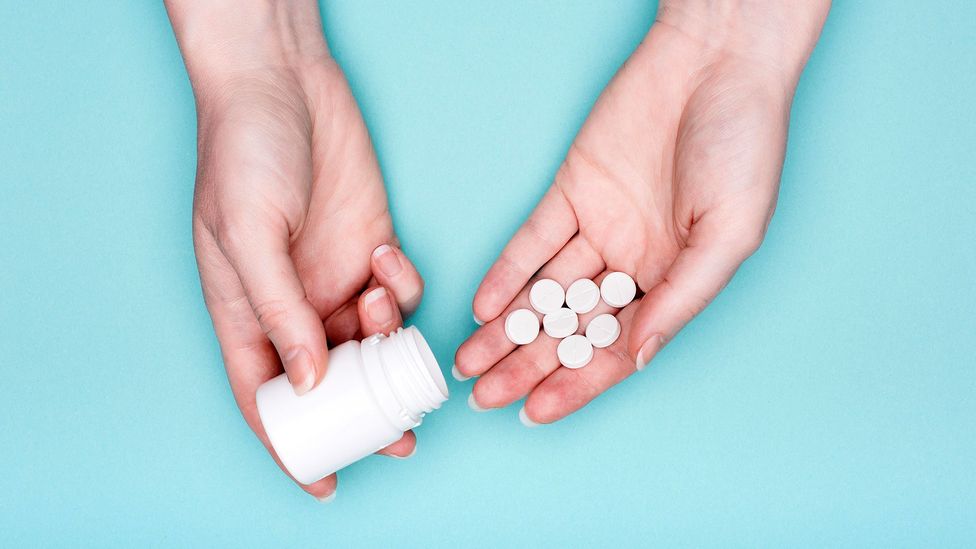
U.s.a. and Canada guidelines suggest taking xv micrograms of vitamin D supplements each mean solar day, but some believe it's not enough (Credit: Alamy)
But with supplements offering doses as loftier as 62.5 micrograms available over the counter, there are concerns around the gamble of excessive vitamin D levels, which can, in rare cases, crusade side furnishings, including nausea and vomiting. In the long term, some studies suggest too much vitamin D can increment risk of cardiovascular disease, although the enquiry isn't conclusive.
But others argue that even more than vitamin D is needed.
In 2012, chief medical officer Emerge Davies wrote a letter to GPs urging them to recommend vitamin D supplements to all at-risk groups, writing that a "significant proportion" of people in the United kingdom probably accept inadequate levels of vitamin D. In June 2018, researchers from the University of Birmingham's Institute of Metabolism and Systems Research wrote that the death of a baby from complications of heart failure caused by astringent vitamin D deficiency, and the serious wellness complications of two others, was just the "tip of the iceberg" in vitamin D deficiencies among those at take a chance.
Suma Uday, co-author of the paper and PhD doctoral researcher at the university, says these deficiencies occur because infant vitamin D supplementation programs are poorly implemented in the UK and non monitored. "In the infants we depict, deficiency occurred because infant vitamin D supplementation was not recommended or monitored. Whatsoever infant devoid of vitamin D for prolonged durations tin can develop low calcium levels, which can result in life threatening complications such every bit seizures and heart failure," she says.
With such conflicting results, it'southward unsurprising that medical experts themselves are deeply divided over the benefits of widespread supplementation. Some even contend that vested interests are propping upwards the billion-dollar vitamin industry, with Spector calling vitamin D supplements a "pseudo-vitamin for a pseudo-illness".
While the contend continues, many experts are looking to Brigham and Women's Infirmary, an affiliate of Harvard Medical School in Boston, whose researchers are conveying out a long-awaited randomised trial, VIital, to investigate whether supplementation of vitamin D and omega three has any effect on cancer, stroke and heart disease in 25,000 adults.
Information technology'southward hoped that these results, expected to publish afterwards this year, volition bring the argue closer to beingness resolved. In the meantime, it's widely agreed that vitamin D supplements, especially over winter, will be a waste material of coin at worst.
Disclaimer
All content inside this column is provided for general data only, and should non exist treated equally a substitute for the medical advice of your own doctor or any other wellness care professional person. The BBC is not responsible or liable for any diagnosis made by a user based on the content of this site. The BBC is non liable for the contents of any external net sites listed, nor does information technology endorse any commercial product or service mentioned or advised on any of the sites. E'er consult your ain GP if you're in any way concerned about your wellness.
--
Join 900,000+ Future fans past liking u.s.a. on Facebook , or follow us on Twitter or Instagram .
If you liked this story, sign upwards for the weekly bbc.com features newsletter , chosen "If Yous But Read half dozen Things This Week". A handpicked selection of stories from BBC Future, Civilization, Capital, and Travel, delivered to your inbox every Friday.
Source: https://www.bbc.com/future/article/20181010-do-vitamin-d-supplements-work
Post a Comment for "Can You Take Vitamin D With Other Vitamins"